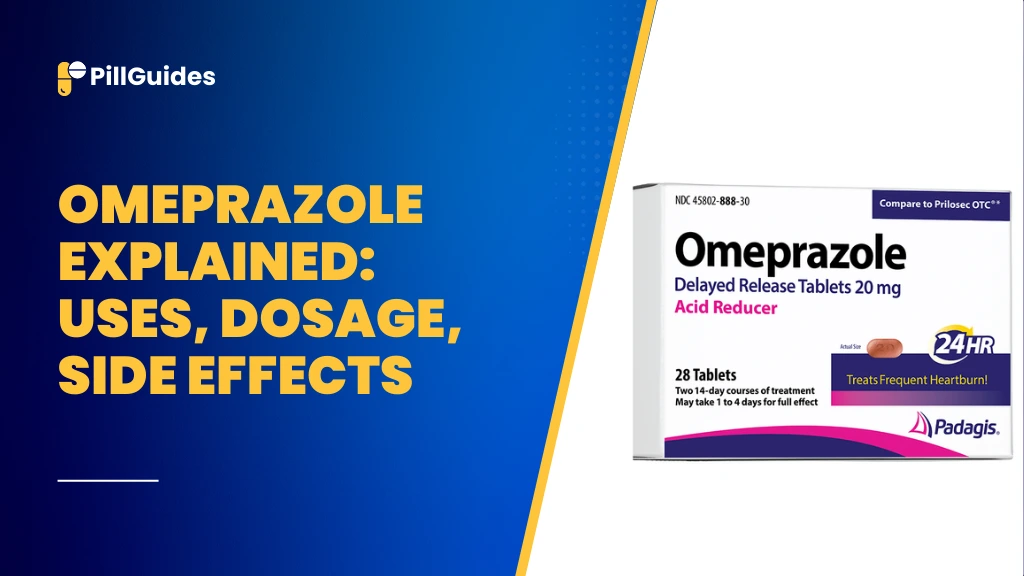Common medication omeprazole is used to treat digestive problems like acid reflux, stomach upers, and heartburn. It is a proton pump inhibitor (PPI), it works by decreasing the amount of acid in the stomach, alleviating painful symptoms, and healing the esophagus against damage. In this article, you will get to know everything about Omeprazole, including what it is used for and how to take it along with its usage doses, any possible side effects, potential interactions, similar medications, and whatever else you’d like to know about Omeprazole.
What is Omeprazole and How Does It Work?
Proton pump inhibitors include the medication class to which omeprazole belongs. It is a highly effective treatment for acid related disorders because it blocks the enzyme in the stomach that produces acid. Omeprazole decreases stomach acid and treats the signs and symptoms such as heartburn and prevents damage to the lining of the stomach and esophagus.
Uses of Omeprazole
Omeprazole is primarily used to treat various digestive conditions, including:
- For Acid Reflux & GERD: It is most commonly prescribed to treat GERD (Gastroesophageal Reflux Disease), which makes your heartburn better and stops acid from going up the esophagus.
- For Stomach Ulcers: Omeprazole is also used to stop stomach ulcers, especially those caused by NSAIDs (nonsteroidal anti-inflammatory drugs). It reduces production of acid, which speeds the healing of the stomach lining.
- For Zollinger-Ellison Syndrome: High doses of Omeprazole are used to treat a rare condition in which the stomach makes too much acid (Zollinger-Ellison Syndrome).
Dosage Guide for Omeprazole
The Omeprazole dosage used depends on the condition being treated. Here’s a general guide:
- Standard Dosages: Omeprazole is available in different strengths, such as 10 mg, 20 mg or 40 mg and doctors normally prescribe 20 mg or 40 mg as adults in a dose once daily.
- Administration Tips: Most people take Omeprazole on an empty stomach, 30–60 minutes before a meal. This is how it is able to better help.
- Dosage Adjustments: The recommended dose can be affected by other factors, including age, your health, and other medicines you are taking. It is best to adjust for elderly patients or those with liver problems following the advice of a healthcare provider.
Side Effects of Omeprazole
Omeprazole can cause side effects, like any medication, most of which are mild and short-lived. Here’s what you might experience:
- Common Side Effects: These include headache, nausea, diarrhea, abdominal pain, and dizziness.
- Serious Side Effects: However, minor Omeprazole long term effects such as vitamin B12 deficiency, kidney problems and an increased chance of bone fractures can occur in some users, though they’re rare. Anyone taking Omeprazole for a period of time should be monitored.
- When to Seek Medical Help: If you have severe abdominal pain, unusual tiredness, or allergic reactions (such as rash, swelling, or breathing problems), go to the emergency room immediately.
Omeprazole Interactions
Omeprazole has medical interactions that could impact on its ability to work well or cause negative effects.
- Medication Interactions: Omeprazole has been shown to affect blood thinners such as Clopidogrel and certain antibiotics. It can also affect medications that have to be absorbed in the stomach.
- Food and Drink Considerations: Omeprazole has some restrictions regarding diet, but since it doesn’t have strict dietary restrictions, it’s best to steer away from alcohol, as it can irritate the stomach lining which may be counterproductive to the medication.
- Supplements: If you are taking a calcium or iron supplement make sure you talk to your healthcare provider about Omeprazole and whether it would affect the absorption of the supplement.
Omeprazole vs. Pantoprazole: Which is Better?
Individual health needs and symptoms when Omeprazole vs. Pantoprazole are considered. Both medications are proton pump inhibitors, yet they have differences:
- Effectiveness: Omeprazole and Pantoprazole are both effective for acid-related conditions but responses can vary from individual to individual.
- Side Effects: Both drugs produce similar side effects although some patients may tolerate it better than the other.
- Doctor’s Guidance: However, it’s up to you to choose between Omeprazole and Pantoprazole provided you use a healthcare provider that helps analyze which is suitable for you in light of your condition.
Is Omeprazole Safe for Long-Term Use?
Long-term use of Omeprazole is generally safe under medical supervision, though there are potential risks to be aware of:
- Bone Health: Long term Omeprazole use has been linked to decreased bone density, and increased risk of fracture.
- Kidney Health: Kidney issues may require monitoring over long-term use.
- Nutrient Absorption: Vitamin B12, magnesium, and calcium may be harder to absorb if you are taking omeprazole. Deficiencies can be managed with regular checkups.
Over-the-Counter vs. Prescription Omeprazole
There are both over-the-counter (OTC) and prescription versions of Omeprazole available, each suited for different uses:
- OTC Omeprazole: OTC Omeprazole is normally in dosages typically available when used to ease occasional heartburn. Make sure you adhere to the dosage on the package.
- Prescription Omeprazole: Prescription Omeprazole is usually given in higher doses, under medical supervision, for chronic conditions such as GERD or ulcers.
Conclusion
Omeprazole is a medication that you can trust for the management of acid resulting from digestive conditions like GERD, reflux, ulcers, etc. Effective at reducing acid production, safe use includes utilizing recommended dosages and noting possible side effects and interactions followed with use thereafter by a healthcare provider for a prolonged time. Omeprazole is a proven aid in reducing pain that makes it necessary and is taken responsibly to help the quality of life of people suffering from acid reflux and related complications.
References
- National Library of Medicine. (2024). Omeprazole: MedlinePlus Drug Information. Retrieved from medlineplus.gov
- Mayo Clinic. (2024). Omeprazole (Oral Route) Description and Brand Names. Retrieved from mayoclinic.org
- Drugs.com. (2024). Omeprazole: Uses, Dosage & Side Effects. Retrieved from drugs.com
- American Gastroenterological Association. (2024). Guidelines on Proton Pump Inhibitor Therapy. Retrieved from gastro.org
Disclaimer
The information in this article is provided for educational purposes only and does not constitute medical advice. Always consult with a qualified healthcare provider before starting or changing any medication, including Omeprazole. Individual responses to medication can vary, and professional guidance is essential for safe and effective treatment.
Read Also: How Long Does Cocaine Stay in Your System? Find Out the Facts Here
FAQs
Can Omeprazole be taken with other drugs?
Yes, but be cautious. Different drugs can have omeprazole interactions that either make it less effective and harmful or just give you other ramifications. We recommend that you always consult a doctor before using personalized advice.
How long can you safely take Omeprazole?
Omeprazole is usually safe in short term however, its long term effect should be monitored by a health care provider.
What should I do if I forget a dose of Omeprazole?
Take it as soon as you remember, unless you are close to the time for your next dose. Don’t double up.
How safe is it to drink alcohol on Omeprazole?
Omeprazole and drinking alcohol may irritate the stomach lining.
Can I quit taking Omeprazole all of a sudden?
Giving up Omeprazole suddenly can call for a rebound in acid production. If needed, you taper off under medical guidance.










